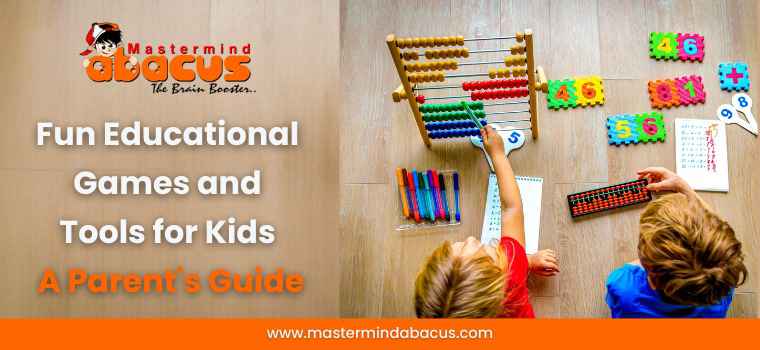
Make Learning Fun with These Educational Games for Kids
As parents, we all want our children to enjoy learning and to associate education with excitement and curiosity. However, with the increasing pressure of academic success, many children begin to see learning as a chore rather than a delightful adventure. How can we change this perception? The answer lies in making learning fun through engaging educational games and tools that captivate young minds and inspire a love for learning.
1. The Power of Play in Learning
Children learn best when they are engaged and having fun. Play-based learning is a powerful tool that helps children develop critical thinking skills, enhance their creativity, and foster a love for learning. Games and educational toys provide an interactive and immersive experience, allowing kids to explore new concepts and ideas without the fear of making mistakes.
For instance, consider the story of Emma, a 7-year-old who struggled with basic math concepts. Her parents introduced her to simple math games, such as “Math Bingo” and “Number Line Hopscotch.” These games turned abstract numbers into tangible objects she could manipulate and play with. Emma soon began to understand and enjoy math, making significant progress in her skills.
2. Educational Games and Tools for Different Learning Styles
Every child has a unique learning style, and using the right educational tools can cater to these differences. Here are a few types of educational games and tools that align with various learning styles:
- Visual Learners: For children who learn best through visual cues, consider puzzles, flashcards, and board games that involve matching or sequencing. Tools like “Tangrams” or “Pattern Blocks” encourage spatial reasoning and geometric understanding, making them ideal for visual learners.
- Auditory Learners: Kids who are auditory learners often excel when information is presented through sound. Educational songs, rhymes, and interactive storytelling apps can help reinforce concepts in a fun and memorable way. Games like “Phonics Bingo” or “Memory Sound Match” are excellent for developing listening skills and auditory memory.
- Kinesthetic Learners: Children who learn best through hands-on activities benefit from games that involve movement and touch. Building blocks, science kits, and tactile learning games such as “Sensory Bins” or “Clay Modeling” provide a tactile and engaging way for kinesthetic learners to explore new concepts.
3. Abacus Learning: A Fun Tool for Developing Cognitive Skills
One of the most effective yet enjoyable educational tools for children is the abacus. Abacus learning is not just about counting beads; it’s a comprehensive brain exercise that enhances a child's cognitive skills, such as concentration, memory, and mental math abilities.
Take the case of Arjun, a 9-year-old who struggled with focus and concentration in school. His parents enrolled him in an abacus class to help improve his math skills. Surprisingly, after a few weeks of practice, they noticed significant improvements not only in his math performance but also in his overall concentration and memory retention. The abacus exercises required Arjun to visualize and manipulate numbers mentally, sharpening his focus and enhancing his cognitive abilities.
If you’re interested in exploring how abacus learning can benefit your child, Mastermind Abacus offers interactive online classes designed to make learning both fun and effective. With experienced instructors and engaging activities, these classes provide a unique opportunity for children to develop critical skills while enjoying the process of learning.
4. Incorporating Technology: Educational Apps and Online Tools
In today’s digital age, technology can be a valuable asset in making learning fun and interactive. Educational apps and online tools provide a variety of games and activities that cater to different age groups and learning needs.
Apps like “Khan Academy Kids,” “Prodigy Math,” and “Endless Alphabet” offer interactive lessons and games that teach a wide range of subjects, from math and science to language and social studies. These apps use game-like features such as rewards, levels, and challenges to motivate children to learn and practice new skills.
Parents can also explore online platforms that offer interactive learning experiences, such as virtual field trips, science experiments, and coding games. These tools not only make learning fun but also provide a comprehensive educational experience that goes beyond the traditional classroom.
5. Tips for Parents: How to Make Learning Fun at Home
Here are some practical tips for parents to make learning more enjoyable for their children:
- Create a Learning-Friendly Environment: Set up a dedicated learning space at home that is free from distractions. Use colorful posters, educational toys, and comfortable seating to create an inviting atmosphere.
- Incorporate Play into Learning: Use everyday activities to teach new concepts. For example, cooking can be an opportunity to teach measurements, fractions, and following instructions.
- Encourage Curiosity and Exploration: Foster a love for learning by encouraging your child to ask questions and explore new topics. Provide books, games, and tools that align with their interests.
- Celebrate Achievements: Recognize and celebrate your child’s efforts and achievements, no matter how small. Positive reinforcement builds confidence and motivates children to keep learning.
6. Conclusion: Making Learning a Joyful Journey
Learning doesn’t have to be a tedious task for children. By incorporating fun games, tools, and interactive activities, parents can transform learning into an enjoyable and rewarding experience. Whether it’s through play-based learning, technology, or innovative tools like the abacus, the goal is to create a positive association with education that lasts a lifetime.
If you’re looking for an engaging way to boost your child’s cognitive skills, consider exploring Mastermind Abacus’s online classes. These classes provide a unique blend of fun and learning, helping children develop essential skills while enjoying the process.
By making learning fun and engaging, we can help our children not only excel academically but also develop a lifelong love for learning.
Remember, every child is different, and what works for one may not work for another. Keep experimenting with different educational games and tools until you find the ones that best suit your child’s learning style and interests. Happy learning!
By following these guidelines and focusing on creating a joyful and engaging learning environment, parents can help their children develop a passion for education that will benefit them throughout their lives.





.png)